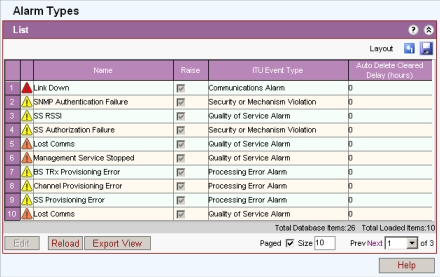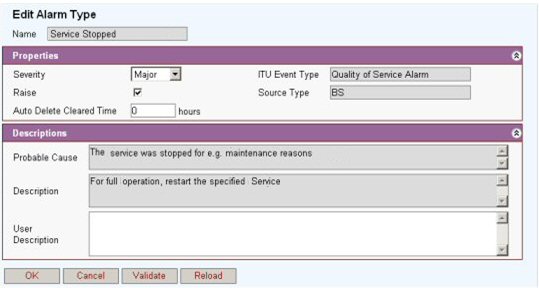
This list displays the alarm types

Alarms in Netspan are raised and cleared by events. Only events that indicate a change of fault status are used to raise or clear alarms. The alarms have predefined severity as follows:
 Warning
(cyan)
Warning
(cyan)
 Minor:
Minor:
 Major:
Major:
 Critical:
Critical:
To edit the alarm properties click the line item and then click the 'Edit' button.

Severity: The severity of the alarm may be set to Critical, Major, Minor or Warning
ITU event Type: Not editable
Source Type: Not editable
Raise: Defines whether the alarm should be raised or not. This can be used to disable the alarm type.
Auto Delete Cleared Time: This setting is used to automatically delete alarms that have been cleared for longer that this period. (0 means never)
User Description: This field is provided for user notes regarding the alarm type.
Probable Cause: Most likely cause of the event
Description: Gives most probable fix
User Description: Field for additional notes
|
Alarm Name |
Probable Cause |
Description |
|
Link Down |
One of the network or radio interfaces is not operational |
|
|
SNMP Authentication Failure |
An SNMP manager is attempting to access the equipment with invalid credentials |
Correct the SNMP Read and Write Communities on the offending manager |
|
SS RSSI |
SS RSSI below permitted threshold |
|
|
SS Authorization Failure |
An SS with invalid credentials is attempting to gain service on the BS TRx |
|
|
Lost Comms |
NMS is unable to communicate with the SNMP agent on the BS TRx |
Loss in communications is normally due to a temporary network condition and will typically clear automatically |
|
Management Service Stopped |
The management service was stopped for e.g. maintenance reasons |
For full NMS operation, restart the specified management Service |
|
BS TRx Provisioning Error |
There was a problem in configuring the per-BS TRx configuration on the specified BS TRx |
To rectify, select the Manual Re-Provision option for this BS TRx |
|
Channel Provisioning Error |
There was a problem in configuring the per-channel configuration on the specified channel |
To rectify, select the Manual Re-Provision option for this channel |
|
SS Provisioning Error |
There was a problem in configuring service for this SS on one of the channels on which it has recently been seen |
To rectify, select the Manual Re-Provision option for this SS |
|
Lost Comms |
The server is unable to communicate with the SNMP agent on the BSDU |
Loss in communications is normally due to a temporary network condition and will typically clear automatically |
|
BSDU Provisioning Error |
There was a problem in configuring the per-BSDU configuration on the specified BSDU |
To rectify, try reprovisioning. (currently trap destination only) |
|
Lost Comms |
The server is unable to communicate with the SNMP agent on the Shelf |
Loss in communications is normally due to a temporary network condition and will typically clear automatically |
|
Shelf Slot BS TRx Connection Fault |
Multiple BS TRxs claim the same Shelf Slot |
Multiple shelves claim same Shelf ID, or BS TRxs do not report Shelf IDs properly |
|
BS TRx Shutdown |
The BS TRx has been manually reset, has a software error or is too hot |
Indicates that the BS TRx is shut down and out of service |
|
BS TRx Temperature High |
The BS TRx temperature has exceeded the warning threshold |
Indicates that the BS TRx has cards that are close to over-heating |
|
GPS Lost Comms |
The BS TRx has lost comms with the GPS module |
Check the connections with the GPS module |
|
GPS Lost Satellite Lock |
The BS TRx GPS module has lost timing lock with satellite(s) |
If this condition persists, check the GPS module |
|
BS TRx Timing Frame Lock Lost |
The BS TRx has lost timing lock with external GPS timing source |
The BS TRx may cease to transmit when in this state |
|
BS TRx Carrier Interference |
The BS TRx has detected a high level of interference on the carrier |
When the interference is detected it may prevent reliable operation of the BS TRx. If this occurs continuously, investigation to locate the source of the interferer is required |
|
BS TRx Obsai Link Failure (partial) |
At least one OBSAI link between the SDR and SCRT has failed |
If this condition persists, check the OBSAI cables between the SDR and SCRT |
|
BS TRx Obsai Link Failure (all) |
The OBSAI link between the SDR and SCRT has failed |
If this condition persists, check the OBSAI cables between the SDR and SCRT |
|
BS TRx RF Transceiver Fault (partial) |
At least one transmitter has been disabled due to detection of a fault |
See the alarm information for details of the fault |
|
BS TRx RF Transceiver Fault (all) |
The BS TRx transmitter has been disabled due to detection of a fault |
See the alarm information for details of the fault |
|
BS TRx Lost GPS Synchronisation |
The BS TRx has lost GPS synchronisation |
Check the connections with the GPS module |
|
DFS Failure |
Radar detected or unable to transmit for other reason |
Raised by DFS system when algorithm cannot find suitable channel to transmit for various reasons |
|
BSDU BS TRx Port Connection Fault |
The BSDU cannot detect BS TRx connection on port |
Check the connections with the BS TRx |
|
BSDU BS TRx Port Power Failure |
The BSDU cannot detect power on port |
Check the power |
Actions
See Action Buttons for other buttons